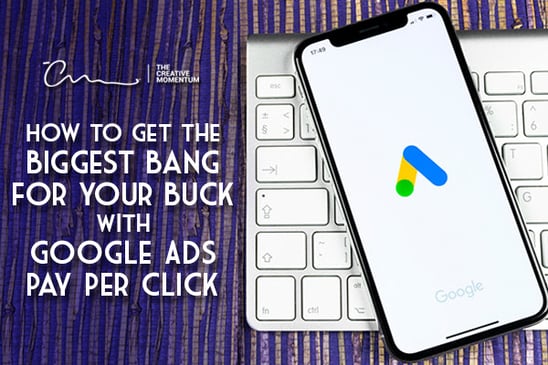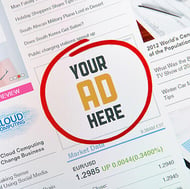
Google Ads pay per click campaigns are one of the single most crucial elements of any paid online advertising efforts. As the largest search engine in the world, Google provides the perfect opportunity for business owners to introduce their products, and services to their target audiences. However, for this very reason, competition runs high (which is where insight from a PPC agency can help). This can sometimes drive up bidding costs, but often times the cost is well worth the return on investment. Even better, there are key strategies that experienced marketers use to get the biggest bang for their bucks via Google Ads.
And, lucky you, as a PPC agency, we're sharing those strategies with you right now.
1. Make Google Ads One Component of Your Larger Marketing Strategy
Google Ads and other pay-per-click advertising models should be just one piece of a cohesive marketing strategy. Without the larger picture, it will be difficult to determine where Google Ads fits in, how much of your resources to allocate to it and the expected results it should drive. Google itself admits that PPC works best at achieving specific outcomes and should complement other strategies for best results.
This isn't to undercut the value of Google Ads -- but it's important to acknowledge where this single tactic comes up short, thus allowing you to find solutions to fill the gaps. In particular, research by Forrester suggests that traffic sourced through organic channels (like SEO) showed higher engagement and brand loyalty than paid channels, so a multi-pronged approach will likely yield the best results.
Stay flexible with your marketing strategy and make changes based on how your ads and other marketing elements perform over time. Knowing your target audience is equally important.
2. Set a Daily Budget
Any PPC agency will tell you that setting a daily limit in Google ads is important. There's a daily limit tool that allows you to set a cut-off point for daily spending. This ensures that you never spend more than your business can afford with your PPC efforts. To determine your average daily budget, Google recommends dividing your monthly budget by 30.4, which is the average number of days in a month.
Fortunately, modern Google Ads tools makes budget management easier than it's ever been. You can set up Ads automation that allows Google to optimize your daily spend across each week and month. If Google's algorithms have determined that your business tends to get more traffic on weekends, the platform will automatically extend your budget to capitalize on the opportunity, while decreasing it during leaner days to ensure everything evens out.
You don't have to be a PPC agency to leverage these tools which, over time, you'll begin to understand how to set up an optimal budget for your Ads in both the short- and long-term.
3. Calculate Your Break-Even Bid
If your business is new, it could take some time for you to determine a max bid amount that allows you to break even or drive profits. Automated bidding and an experienced marketing professional or PPC agency might help you speed this process along. If you prefer to do this manually, here are some steps recommended by Google:
- Determine the average per-purchase profit for the product or service you’re advertising.
- Determine how many visitors check out your landing page on average before one makes a purchase.
- Use that number to determine your maximum bid.
For example, pretend that you own a shop that makes custom acoustic guitars. You make $100 on every guitar you sell and have noted that, on average, one in every 10 visitors to your website buys one. Your break-even CPC bid is $10. Set an even lower bid to make a profit.
4. Conduct Keyword Research
Some keywords attract big prices. One good example is “travel” in the flight industry. Thankfully, there are many other related keywords businesses can use to attract their target markets. In fact, some of these keywords do a much better job of homing in on their desired demographic of customers. Consider these three elements of the perfect keyword list:
- Exhaustive: While you should still include popular and obvious keywords that attract high competition, extend your search beyond this. Look for not just niche keywords but also long-tail keywords. Long-tail keywords phrased as questions have seen a remarkable surge in effectiveness due to voice search and snippets in the SERP Zero Position.
- Relevant: Of course, the keywords you choose should be relevant to your business, products and services. However, be open-minded about peripheral keywords. For example, if you own a seasonal business that relies heavily on tourism, you might find it useful to post travel content that brings more tourists to your area, and by extension, your business.
- Expansive: No keyword list should be static or have a limit. While you should certainly make note of your most effective keywords, you should also continue to expand your list, so you can experiment with new additions over time. This is one of the best ways to remain competitive and gain dominance over a keyword before competitors catch on and competition spikes.
5. Leverage Geo-Targeting Tools
For most businesses, posting ads to customers in other states or countries is not beneficial to the bottom line. Use geo-tagging tools to ensure that you’re reaching people only within your preferred geographic areas. If you own an online business with the potential to serve an international market, find out where most of your customers currently live and focus more heavily on these areas. You could also focus your attention on the markets you are confident your business can tap into and in which you can maintain a strong foothold in.
6. Create Eye-Catching Ads
As a PPC agency, we can tell you that even with the best keyword strategy in the world, it will amount to nothing if you haven’t mastered the art of creating compelling ads. These ads should grab your viewers’ attention in the first few seconds and prompt the desire to know more. This will cause them to click on the ad and visit your website. These are some tips to make your ad more click-worthy:
- Decide if you want your ads to show up in search results or on the Google Display network and create separate campaigns for each.
- Hire professional content creators to write engaging ad copy that attracts your current and future buyers.
- Use colorful and attention-grabbing graphics whenever possible in the Display Network or Shopping Ads.
- Leverage Google Ad extensions to boost your ROI.
- Minimize the use of clickbait titles; Generation Y and Generation Z have become skilled at spotting and avoiding them.
7. Use Campaign-Specific Landing Pages
Google's pay per click ads can send visitors to your website, but it’s the landing page that converts them into buyers. This is why it’s important not to send visitors to your home page. A cohesive strategy and strong message calls for special landing pages that you can refer visitors to based on a number of factors, such as location, product or service, budget and promotional offers.
It's not just good practice -- modern customers expect it. Have you ever clicked on an outbound link to an interesting-sounding blog or a video, only to be directed to a company home page? Annoying, right?
This is even worse when it applies to targeted ads. It's hard enough to get a qualified reader to click an ad. If readers do click your offer but get re-directed to your website, do you really expect them to do the legwork of tracking down the offer again and following through? This will end up dinging metrics like time spent on-site, which in turn may cause Google to decrease your page's quality score.
Set up campaign-specific landing pages (optimized for SEO, naturally) with tailored details that may nudge the reader to convert. Consider adding more promotional details, testimonials for social validation, or other tidbits that help you assuage customer concerns. If your offer is just that good, you may find that your landing page starts to outrank your home page!
8. Track Your Results
The only way to know whether you’re getting a high return on investment is to accurately track your results. Google provides a wealth of basic tools that can help you determine how well your ad campaign performs.
You can step things up by working with an experienced marketer or PPC agency who can better analyze these results based on their experience. Marketers can also better determine the appropriate role PPC ad campaigns should play in your marketing plan.
Our team at The Creative Momentum regularly creates effective campaigns that deliver strong results for our Atlanta clients. While Google Ads pay per click advertising can yield great results, we've also had clients come to us after losing money quickly trying to manage everything. We'd love to help you avoid that mistake, so we encourage you to get in touch with our marketing and PPC agency for a free quote, and we'll help you get the most bang for your buck using Google Ads.





